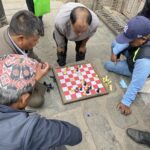
Understanding Anxiety: Is It Just Stress or Something More?

Do you feel your heart racing, your hands trembling, or sweat forming on your palms before a big presentation? Are you concerned that you will perform poorly? If so, you are not alone. These emotions are typical responses to stress, and most individuals experience them in high-pressure situations such as giving a presentation, starting a new career, or making a huge life change, such as migrating to a new country.
However, anxiety becomes more than just a passing feeling when it exceeds to the point where it’s excessive or chronic. When even basic decisions like how to dress for a job interview or attending a social function feel suffocating. If this sounds similar, it may indicate that your anxiety is harming your daily life.
A lot of people deal with anxiety because of one stressful situation, but for immigrant youth, it’s usually deeper than that. Growing up in a new country means constantly trying to balance two different worlds—your family’s traditions and expectations, and the challenges of trying to fit into a completely new environment. That double identity can be meaningful and even empowering, but it also brings a lot of pressure. And for many of us, that pressure eventually shows up as anxiety.
As a Bhutanese Nepali immigrant, my first day of school in a new country felt like stepping into a completely different world. I remember wandering through the hallways, not knowing where to go, surrounded by unfamiliar faces and a language I could barely understand. That’s when it hit me—how heavy everything really was. I was expected to figure things out, to adjust quickly, and to somehow succeed in this new place. My parents were counting on me to make it work, and that pressure sat on my shoulders every single day. The fear of the unknown, of not fitting in, created this constant inner conflict I didn’t even realize was building inside me. It wasn’t just stress—it often turned into anxiety that felt overwhelming at times.
In Bhutanese Nepali community, conversations around mental health are often limited and even stigmatized. Anxiety is frequently dismissed as “just stress” or considered a sign of personal weakness. Many immigrant families believe mental health issues can be resolved through resilience or simply working harder. As a result, many young immigrants suffer silently, afraid to disappoint their families or appear weak in the eyes of their community.
I’ve noticed a significant generational difference in how anxiety is addressed in Bhutanese Nepali immigrant households. Older generations, like our parents, often carry the trauma of displacement, yet they rarely speak about their experiences openly. Instead, they cope quietly, setting an example that emotional struggles should be endured silently. Younger generations, however, are more open to discussing their emotions and seeking help, but they often face barriers due to misunderstandings or dismissive attitudes from their elders.
My friend, who moved to the U.S. from Nepal, shared that her anxiety escalated during high school because her parents expected her to excel academically without fully understanding her emotional struggles. Another friend once confessed that attending social events made him anxious because he constantly feared making mistakes or not meeting the family’s expectations.
Navigating my own anxiety was tough, especially in my teen years when peer acceptance and family expectations often clashed. I learned that speaking openly about my experiences with trusted friends and mentors significantly eased my anxiety. By acknowledging the issue, I began to heal and thrive.
Mental health, specifically anxiety, needs more visibility within our immigrant and former refugee communities. We must create safe spaces to discuss mental health without stigma or judgment. Encouraging conversations can foster understanding, empathy, and supportive environments that help individuals navigate their mental health journeys effectively.
Local resources like mental health counselors, community workshops, and support groups at organizations such as Bhutanese Community of Central Ohio (BCCO) can offer meaningful support. Remember, seeking help is not a sign of weakness; it’s an act of courage and strength. Together, we can ensure no one has to face anxiety alone.
-Written By Kamala Sharma



